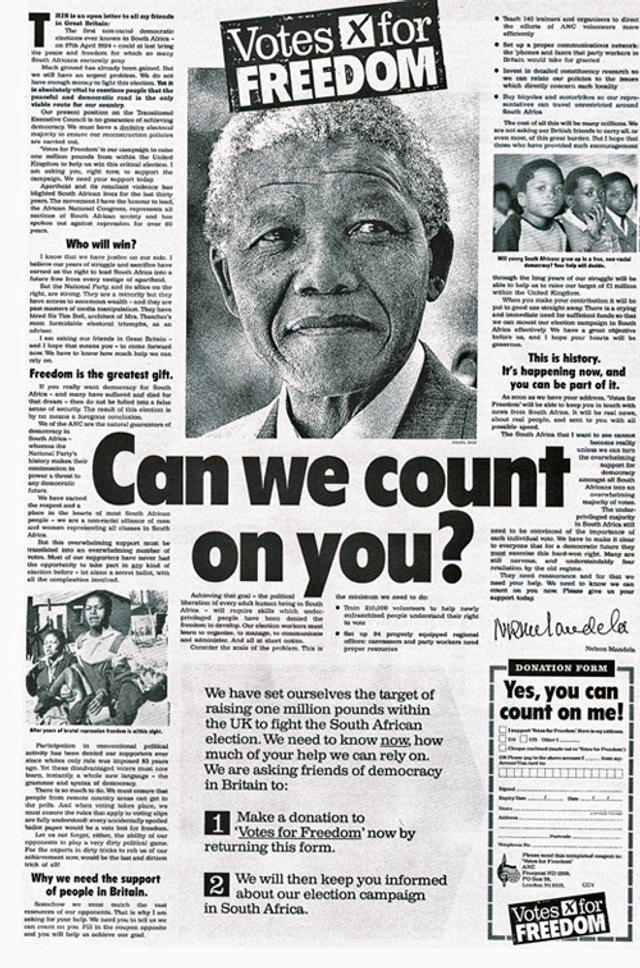African National Congress: the emergency pre-election fundraising, from 1992
- Exhibited by
- Daryll Upsall
- Added
- February 27, 2010
- Medium of Communication
- Direct mail, press advertising, publications, telephone
- Target Audience
- Awareness, individuals, major gift, regular gift, single gift, social change campaign, intermediaries
- Type of Charity
- Human rights & civil liberties, political
- Country of Origin
- UK
- Date of first appearance
- 1992
SOFII’s view
This exhibit takes us back to a time when effective fundraising played a critical part in the democratic process, helping to ensure the practical end of the evil apartheid regime in South Africa. The outcome of this activity is well known. What's less appreciated is that the fundraising campaign that made such a difference had zero funding. But this was fundraising with fire in its belly, so that when the need came, the people charged with the task just went out and did it. Its approach is perhaps best summarised by Daryl Upsall, when he asks and answers the key question, 'Did we make our £1 million target? We sure as hell did. And doubled it.'
Creator / originator
Lyndall Stein and Daryl Upsall. The WWAV agency in London, at least partly funded by the ANC, did much of the creative work for the packs and press ads.
Summary / objectives
To raise £1 million to fund the ANC's campaign to win the first multi-racial, multi-party election in post-apartheid South Africa.
'When asked how much he needed,
he calmly replied, '£1 million – and within six months.'
When asked what the budget to invest was, he simply
raised his hand to make a simple gesture of the figure 0. Yes, zero.
He then asked, 'Will you do it?' Of course, they said yes.'
Background
In the early 1990s, Lyndall Stein and Daryl Upsall, friends and colleagues from many years earlier, were working at the Terrence Higgins Trust, the UK's first and leading HIV/AIDS charity. Lyndall had previously headed up the ANC in exile's very succesful fundraising campaign in the UK. When she asked Daryl to put on a suit and go with her to meet Mendi Msimang, ANC Head of European Mission, he knew she had a special plan in mind.
At that meeting, Mr Msimang explained that, although Nelson Mandela had been released from prison, all was not well at the ANC. There was less than a year to go until the first democratic election in South Africa and, basically, all that had been raised previously was now spent, and they didn't have any money.
Nelson Mandela was essentially the only fundraiser racing around the world asking for financial support. The white South African parties were successfully convincing the media that if there was an ANC landslide at the election all business would flee the country and it would be ruined.
Something had to be done, said Mendi Msimang, When asked how much he needed, he calmly replied, '£1 million – and within six months.' When asked what the budget to invest was, he simply raised his hand and, without a blink of an eye, made a simple gesture of the figure 0 – yes, zero. He then asked, 'Will you do it?' Of course, they said yes.
Daryl continues the story.
'Lyndall and I were both hugely exhilarated, excited and just a little scared, but we knew then we would do it. With no budget, no offices, only one paid member of staff and six months to achieve our goal we needed to take a novel approach.
We formed a 'Votes for Freedom' shadow fundraising team, who volunteered their time from 6 pm to 10.30 pm. And what a team it was – Simon Pell and colleagues from Pell and Bales, folks from Grey Advertising, trade union activists, ANC volunteers, fundraisers from other causes, Burnett Associates staff. They were exciting and heady times.
'Our strategy had four elements.
1. A mass campaign using press advertisements and direct mail to build awareness, as well as a large base of donors. The donors were phoned by the Pell and Bales telephone teams and converted into monthly direct debit/standing order committed givers.
The press adverts, largely in the Guardian, were discounted space paid for by the volunteer team itself along with their friends, family and colleagues. They featured the charismatic smiling face of Nelson Mandela urging UK citizens to vote with their money to support the ANC election under a 'votes for freedom' banner. It worked phenomenally well. As the cheques and standing orders came in more adverts were bought.
2. A major donor campaign was launched to raise gifts of about £10,000. We organised private receptions, such as one at the home of the London-based, South African IT multi-millionaire David Potter of PSION hand-held computers. There about 60 guests mingled over snacks and South African wine, whilst in the awesome presence of Mr Nelson Mandela. I recall a donor using my back to rest on as he wrote a cheque for £10,000.
3. Nelson Mandela's first UK press conference at the prestigious Dorchester Hotel was attended by 600 international journalists. It was such a resounding success that Mr Mandela had to close down a standing ovation as he entered the room.
A fundraising reception followed the press conference. Chairmen and chief executives of leading UK businesses (especially those with investments and interests in South Africa), trade union leaders and celebrity supporters of the ANC from the worlds of entertainment and sport were invited. During this event Nelson Mandela was photographed shaking hands with business leaders, which played a role in dispelling myths that the ANC would be bad for international business. Pledges of financial and gift-in-kind support were plentiful, but it has to be said were poorly followed up by the ANC office in the UK.
When Nelson Mandela spoke with his typical humility, humour and total lack of rancour the 500 or so people in the room knew they were in the presence of an exceptional man and that he just had to become the next president of South Africa. I recall the CEO of a major high street bank weeping on my shoulder at the end of the speech. My tears came later as I walked home at midnight with the memory of the event and the warm handshake and hug that Mr Mandela gave me when thanking me for the campaign. No reward in fundraising has ever been finer.
4. The final element of the campaign was a mass event to be held at Central Hall Westminster where the public could buy tickets to a mass rally, which included speeches by Nelson Mandela and celebrity supporters. It would have been a huge success but Mr Mandela was called to Holland to receive a million dollars and a soccer world cup medal from the black Dutch player Frank Rijkaard. Our event was cancelled but it showed that the ANC was receiving fantastic support across the world.
Did we make our £1 million target? We sure as hell did and doubled it. Nelson Mandela was elected president of South Africa, Mendi Msimang became the first black South African High Commissioner (ambassador) to the UK, where I last saw him in the mid 1990s. He has now retired to South Africa and is treasurer of the ANC.
It did not all end there. We didn't want to lose the momentum that had been built up, so after the election we invited young South African ANC activists to Burnett Associates, where a team of Burnett's staff and NGO volunteers trained the next generation of ANC fundraisers.
Special credit to every member of the votes for freedom team for their exceptional vision, innovation, tenacity, good humour, damn hard work and dedication to the cause.'
Influence / impact
It pioneered professional political fundraising in the UK and involved the British public in playing an active role in getting rid of apartheid forever.
Details
Fundraising tools employed included: high level volunteering, full-page press advertisements, monthly direct debit/standing orders, telephone fundraising, major gift fundraising, social network fundraising (before the term was invented).
Results
£2 million raised in six months with no budget and just one paid member of staff.
Merits
It is an exceptional example of a group of professional fundraisers using their spare time to build a fundraising campaign from scratch, with zero budget and amazing results. The ANC won, Nelson Mandela became the first black president in South Africa… the rest is history.
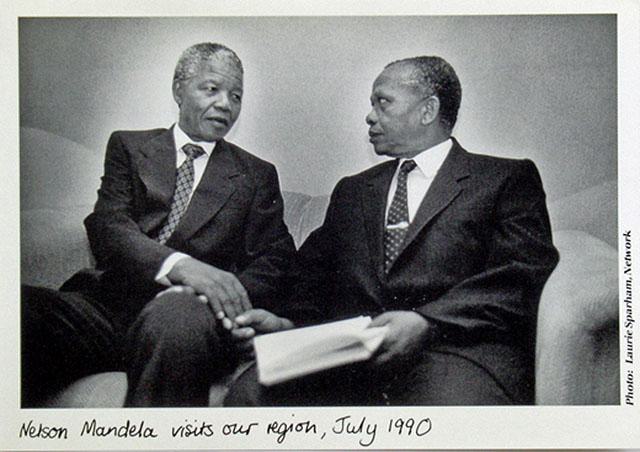 View original image
View original image
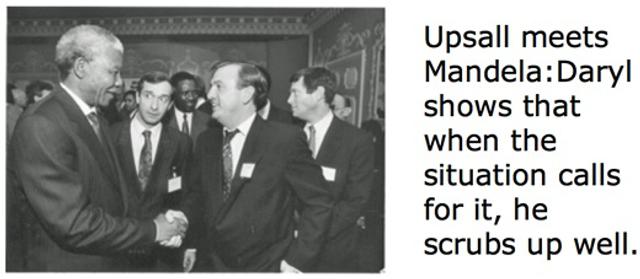 View original image
View original image
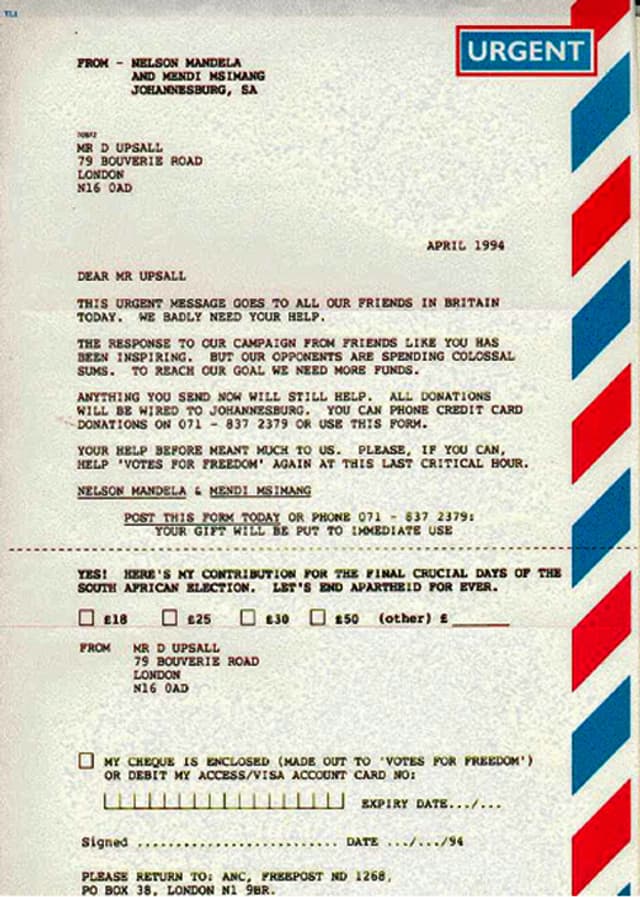 View original image
View original image
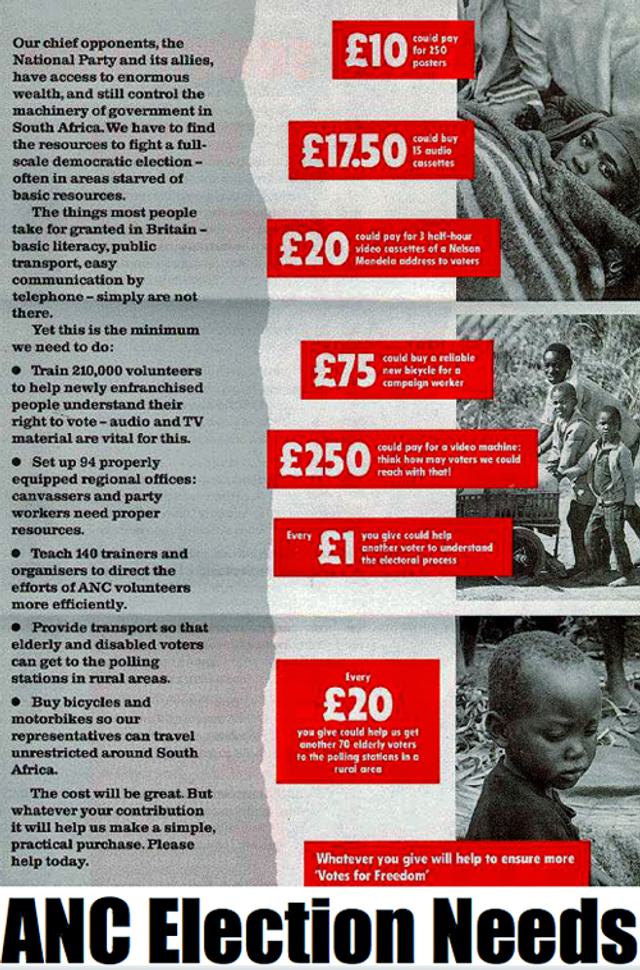 View original image
View original image



